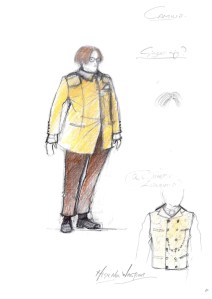Review: The White Devil (Shakespeare's Globe)
Annie Ryan directs John Webster’s 17th century tragedy
It’s fascinating to see Annie Ryan’s production of John Webster’s early 17th century classic in a week when The Guardian’s Michael Billington has precipitated a debate about the role of classic theatre.
Here we have a fine example of the revenge tragedy, full – as they mainly are – of lust, jealousy and violent death, of obsessive brothers and corrupt cardinals, of poisoned masks and malicious feuds, of devils and whores. The plot – beautifully summarised in the programme – is all about a family on the make. The beautiful Vittoria is married to the foolish Camillo and her brother Flamineo sees his opportunity to pimp her to a rich and powerful Duke. The fact that the Duke has a virtuous wife is no obstacle.
Murder and mayhem ensue, with one family swearing vengeance on the other and falling out among themselves. The whole thing ends with a pile of bodies. Ryan, assisted by Jamie Vartan’s cleverly timeless designs, tries to make the play speak to a general sense of dystopia, of times out of joint where women are abused and men run riot. She makes brilliant use of the candle lighting of the Sam Wanamaker Playhouse to cast deep shadows in this world of darkness, where morals are muddied and unclear.
The trouble is that the play resists all moves towards generality. It is a work deeply rooted in its own period, fascinating for the light it throws on other plays (it quotes Ophelia’s mad scene from Hamlet virtually wholesale) and what it tells you of the doubts and fears of the early 1600s. Its language is occasionally fantastically powerful, the word devil blossoming across the stage in its own dark cloud, the richness of its imagery of corruption and melancholy striking the ear, but it doesn’t speak more generally; there is no one to identify with, no clear moral arc.
Its greatest asset in this production is an astonishing performance from Kate Stanley-Brennan as Vittoria. Webster doesn’t give her much to work with but her stillness and subtlety are mesmerising whether she is exhibiting scornful defiance in the court scene, where she is put on trial for a murder her brothers committed, or simply reacting to the horror of her lot.
The other performances are more variable, though Joseph Timms has a whirring energy as Flamineo which makes the most of the theatre’s intimate space, and Garry Cooper has a nice line in the sinister as the truly repellent Monticelso.
The White Devil runs at Shakespeare's Globe until 16 April.
Click here to read designer Jamie Vartan on The White Devil













